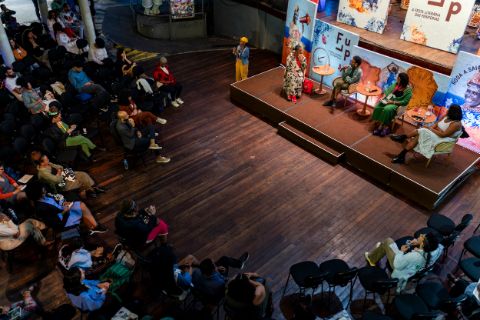Writing Against the Map
With Luciany Aparecida, Vinicius Jatobá, and Amara Moira, moderated by Jess Oliveira
Conversation
Fri., 10.10.2025
19:30–21:00
Safi Faye Hall
In Portuguese with simultaneous translation into English and German
Free entry

Photo: Festa Literária das Periferias (FLUP), 2024
Maps promise orientation, but they also bind violence to territoriality: borders and states are almost always born of violence. Before the rise of modern states, space was not fixed by abstract lines. Boundaries overlapped, allegiances shifted, and belonging was shaped by relations of kinship, obligations, and faith. With the colonial map, these layered forms of space were flattened into fixed borders that divide families, enforce hierarchies, and marginalize or erase the presence of certain lives. To write against the map is to refuse these imposed coordinates, to expose the gaps, and to invent new paths through language, memory, and imagination.
In this panel, three authors discuss the intersections between literature and resistance, with writing as a pathway for redrawing geographies without erasing complexity. Vinicius Jatobá, known for his daring experiments in fiction, theatre, and criticism, writes of exile, fractured intimacies, and the unstable architectures of belonging. In his narrative poem Still Life (Granta, 2012), a single unbroken sentence spans whole generations, showing how memory and rupture can inhabit the very form of a story. Amara Moira, writer, scholar, and activist, brings an unflinching voice shaped by lived experience. Her essays and stories confront the hegemonies of gender and sexuality, insisting on the presence of trans lives in Brazil’s literary and political landscape. With a mixture of tenderness and fire, her writing turns confession into critique and personal truth into collective resonance. Luciany Aparecida dissolves the idea of a single authorship by writing under multiple aesthetic signatures. Across poetry, fiction, and drama, she summons the memory of rural Bahia, the echoes of Afro-Brazilian ancestry, and the body as a site of resistance. Her work insists on multiplicity, refusing the narrow maps that try to contain identity or literature.